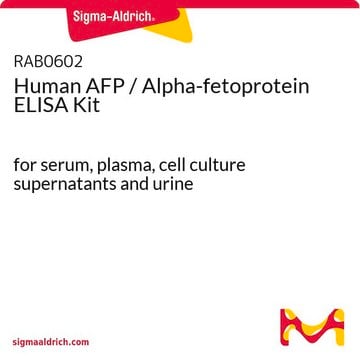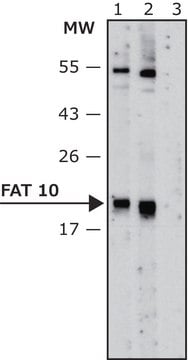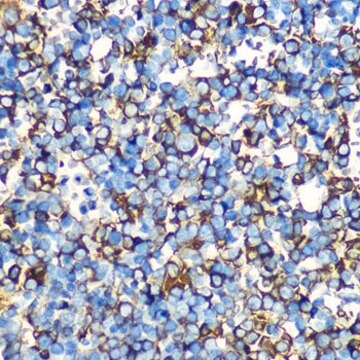SAB4200746
Anti-α-Fetoprotein (AFP) antibody, Mouse monoclonal
clone C3, purified from hybridoma cell culture
Sinónimos:
Anti-AFP, Anti-Alpha-1-fetoprotein, Anti-Alpha-fetoglobulin
About This Item
Productos recomendados
biological source
mouse
Quality Level
conjugate
unconjugated
antibody form
purified from hybridoma cell culture
antibody product type
primary antibodies
clone
C3, monoclonal
form
buffered aqueous solution
mol wt
~74 kDa
species reactivity
human, canine, porcine
concentration
~1.0 mg/mL
technique(s)
ELISA: suitable
dot blot: suitable
immunoblotting: 2-4 μg/mL using liver hepatocellular carcinoma HepG2 cell line extract
immunofluorescence: suitable
immunohistochemistry: 2-4 μg/mL using formalin-fixed, paraffin-embedded human fetal liver sections
isotype
IgG2a
UniProt accession no.
shipped in
dry ice
storage temp.
−20°C
target post-translational modification
unmodified
Gene Information
human ... AFP(174)
General description
Immunogen
Biochem/physiol Actions
Physical form
Storage and Stability
Other Notes
¿No encuentra el producto adecuado?
Pruebe nuestro Herramienta de selección de productos.
Storage Class
10 - Combustible liquids
flash_point_f
Not applicable
flash_point_c
Not applicable
Elija entre una de las versiones más recientes:
Certificados de análisis (COA)
¿No ve la versión correcta?
Si necesita una versión concreta, puede buscar un certificado específico por el número de lote.
¿Ya tiene este producto?
Encuentre la documentación para los productos que ha comprado recientemente en la Biblioteca de documentos.
Los clientes también vieron
Nuestro equipo de científicos tiene experiencia en todas las áreas de investigación: Ciencias de la vida, Ciencia de los materiales, Síntesis química, Cromatografía, Analítica y muchas otras.
Póngase en contacto con el Servicio técnico









